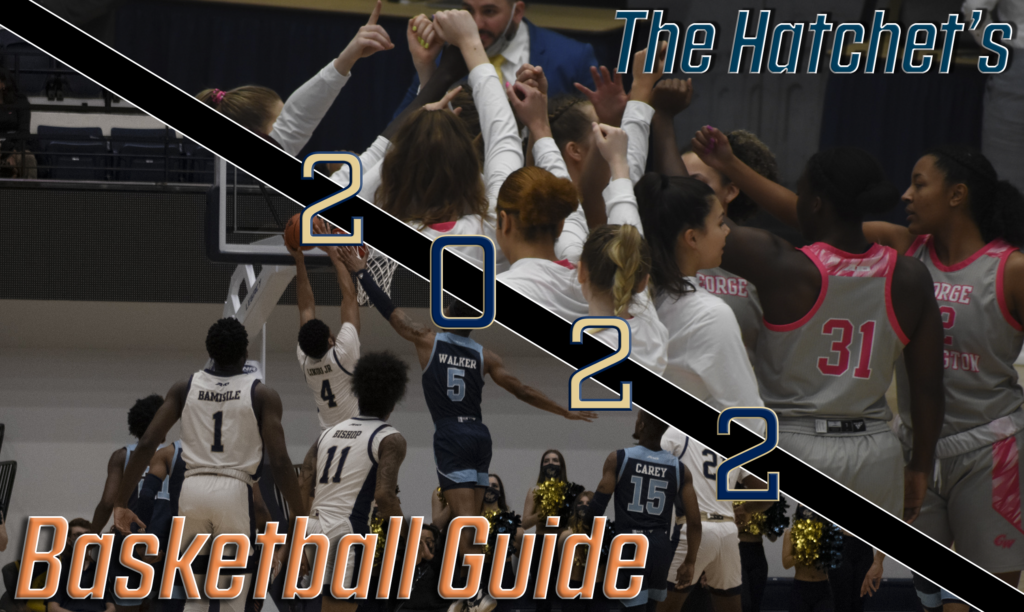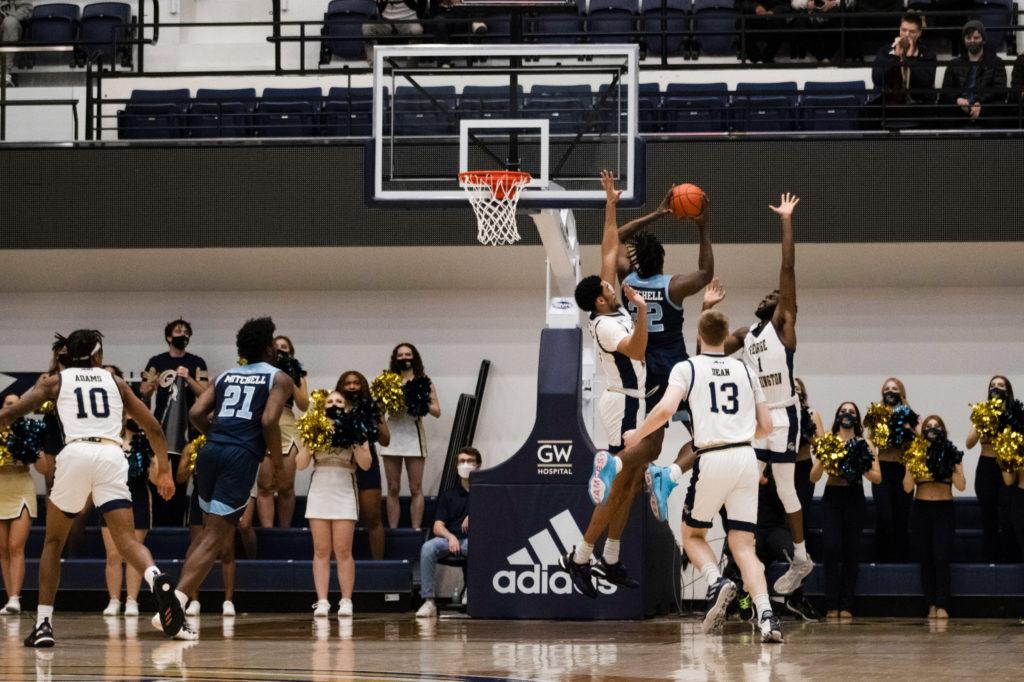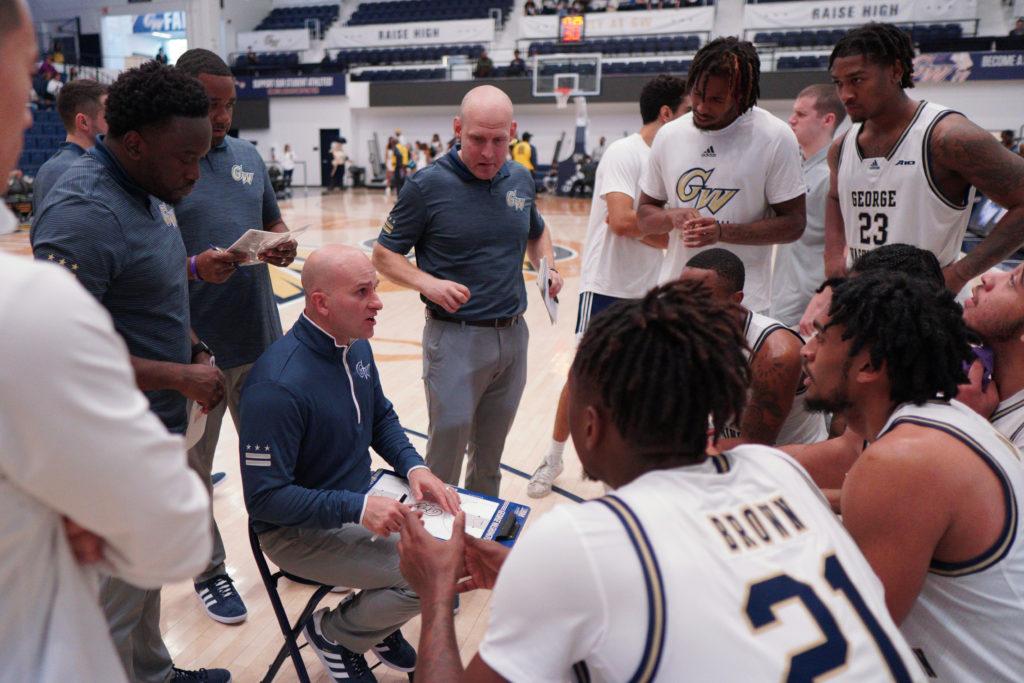Head coach Jonathan Tsipis has a favorite metaphor when talking about the graduate students on his roster: helping them write the “final chapter” of their Colonial basketball careers.
The women’s basketball team will suit up three graduate students this season, but two have a special bond that stretches back, far past GW – years past, in fact.
Tara Booker and Sara Mostafa each have a chance to play a fifth year as best friends and lifelong teammates, suiting up together in middle school, when they competed on the same AAU team at Absegami High School in Galloway, N.J. and then as Colonials.
“The challenge I’ve had for them is: What are you going to write with the last chapter of your career?” Tsipis said. “You can’t control what’s happened before, but this chapter to me is what’s going to determine their legacy with GW women’s basketball.”
Both committed to GW during their senior year of high school, drawn to the school for its strong academics, but also for the chance to immediately impact the basketball program.
At that time, the Colonials were a top-25 program, coming off the reign of Joe McKeown, who posted a career record of 441-154 at GW, transforming the team into a national contender. It was an outstanding program with immediate opportunities for incoming recruits to shine.
“Academics were important, but I also wanted to be able to play right away,” Booker said. “There was a wide-open spot for me on the team to come in and contribute my freshman year.”
Booker and Mostafa are quick to agree that suiting up with a close friend at GW helped them bear the weight of two uniquely challenging collegiate journeys.
The graduate students are both eligible for a fifth year of NCAA play, after suffering injuries that kept them sidelined for a majority of a season. As a sophomore, Booker had to sit out for the final 20 games of the year due to a knee injury. Still, she said, she felt that she could almost play vicariously through Mostafa due to the strong bond they share off the court.
“It has helped having Sara there by my side through everything,” Booker said. “Since I was on the bench during games sophomore year, I was frustrated that I couldn’t contribute on the court. I am glad that Sara was always there, because I would be able to play through her and would help her make plays on the court.”
The two reunited on the court as juniors, and the following season, as seniors and co-captains, they hoped to guide the team to a more successful season together. But then Mostafa suffered a broken hand in practice, causing her to miss the last 21 games of the season.
Their roles from their sophomore season were reversed senior year: Mostafa, the center that former head coach Mike Bozeman structured his offense around, was looking for Booker to be her presence on the court. But the team went 11-18 last season – the end of a four-year slide – and Bozeman, the only collegiate coach either Booker or Mostafa had ever played for, was fired.
As the two prepare to retake the court for their final campaign together, this time with a new coach, they’re still rooted in familiarity with each other’s game.
“We know exactly how each other plays. Being on the court, we have a lot of chemistry,” Mostafa said. “I know where she wants the ball, and she knows where I want the ball. She knows exactly how to set a screen for me to make me open.”
Aiding the transition is the faith both Booker and Mostafa have in their new head coach; Mostafa said both she and Booker have worked to encourage their younger teammates to share Tsipis’ vision for the program.
Booker, who compared having a new coaching staff take over the program to being a freshman again, said that while many would consider this season to be a rebuilding year for GW, she knows that Tsipis wants her, Mostafa and fellow fifth-year senior Brooke Wilson to find success in their final seasons.
“If you ever sit down and have a conversation with him, you can tell that he has a brilliant basketball mind,” she said. “Just hearing about his experiences and credentials made us really excited to play for him.”
And as he begins his inaugural season, Tsipis is confident the veteran players will learn to adapt to his coaching style and philosophy.
Their roles may change under a new system, he said, but Tsipis is confident in their leadership abilities. The teammates’ drive, focus and ferocity on the court is contagious.
“I think on the court they are able to understand that even though they are fifth-year seniors, I expect them to be able to change and to change to what we’re trying to do and to be two of our hardest workers,” Tsipis said. “And I think you have a good team when your best players are your hardest workers.”






